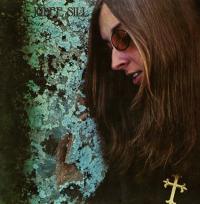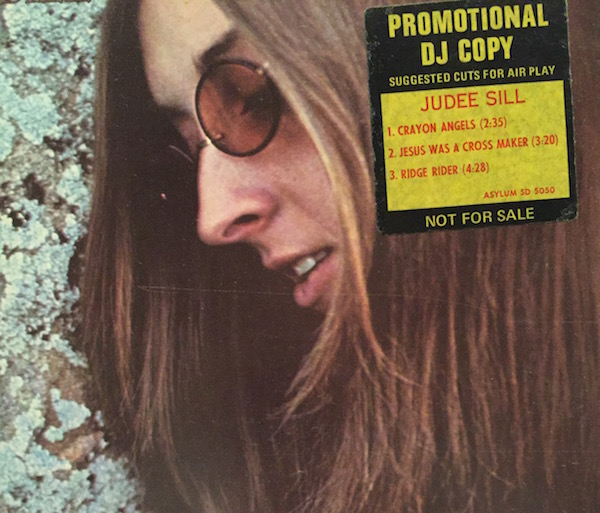These reissues sound wonderful - I hope Intervention doesn't take a bath on them. It took some grit to give the audiophile treatment to what are essentially cult favorites, and bring them to market like this!
The Judee Sill Cult Continues, This Time at 45rpm
Sometimes "legends" are created and nurtured simply by tragic circumstances. In Judee Sill's case add wasted talent and unfulfilled great promise that add up to a movie worthy story. Sadly, obscure, dead musician biopics do not usually produce good box office, though a strong case could be made for producing this one.
Sill's father, who owned a dive bar, died when she was a child. Her mother remarried badly to an abusive alcoholic who beat her and she fought back. She was attracted both to art and crime and sadly with both of her husbands ended up repeating her mother's mistakes. Armed robberies and dabbling in heroin followed. She was caught and sent to reform school where she studied music and art.
In 1964 she was living in the San Fernando Valley with a friend and then came LSD. She hooked up with a bass playing acid dealer. She told a Rolling Stone reporter in 1971: "Then I met an acid dealer. I went by his place to cop and ended up movin' in with him that same day. We took some LSD together and listened to Gil Evans play "Out of the Cool.' It was a great romance, for a while."
But the habitual substance abuser dropped daily and lost touch with herself. She met a guy, became a junkie and a scammer and really hit bottom before cleaning up her act and deciding to become a songwriter. She certainly had enough experience to write from reality.
Judee Sill was a rolling stone, a dabbler, an abused "everywoman"and as this record demonstrates a cultural desiccant who absorbed the surrounding culture and, with the help of people like Graham Nash and engineer Henry Lewy among others, produced two magnificent albums of string-infused "baroque folk" that Michael Brown would have happily called his own. She's credited with the arrangements on this 1971 release but the delicate, sophisticated orchestrations were by jazz musicians Don Bagley (misspelled as "Bagly") and Bob Harris, both of whom had formidable careers as performers and arrangers.
(original promo album cover)
So yes this album and her follow up Heart Food (also reissued by Intervention) have a somewhat dated "hippie of the canyon" feel that's also true of this period's Joni Mitchell's records but it's a time well worth revisiting. You'll also hear in Sills' melodic constructions echoes of other young musicians of that time especially Jackson Browne, but Sill establishes here her own voice. You will hear through her imagery, religious and otherwise, a longing for normalcy and redemption, as well as betrayal and other of the often sad and empty experiences Sill endured in her life, but all expressed with great beauty and delicacy wrapped in soaring melodies.
The more you learn of Sills' short, tragic life, the more you will appreciate the beauty and delicate imagery that fill these two albums. Her life seemed to be taking the right turn when she got a call from Jim Pons of The Turtles (later of The Mothers of Invention and other groups) who had befriended her when she was in jail (not exactly sure of those details). He offered Sills a songwriting job for the group's Blimp Productions publishing arm. She got an advance, a guitar and a $65 a week salary.
The group recorded her song "Lady-O", it charted. Then David Geffen called. It all could have worked out differently and based upon these records it should have. Blaming Geffen would be easy, but Sills was damaged goods and had trouble being an opening act, though she opened for David Crosby and Graham Nash among others (Nash produced the single "Jesus Was a Cross Maker). The elevated sense of self that helped produce these gems from the trash bin of her life (with a lift from some peyote), probably also prevented her from seeing the value of being an opening act. After all, she'd gone from nothing to being Asylum's first signed act! Perhaps it was all too easy (written ironically) but more likely she was fragile and broken and couldn't absorb yet more failure.
So you have a long forgotten gem (though an album still revered a friend tells me by many of today's top young L.A. area talents), engineered by the great Henry Lewy, superbly reissued on double 45 rpm vinyl cut from the original analog tapes by Kevin Gray and Tip-On gatefold jacket packaged too.
For hippie era listeners unfamiliar with Sill this will be like a detour up an unfamiliar Laurel Canyon road circa 1970. For younger listeners it's yet another reminder that that era was one of vast riches, some of which remain untapped to this day. It was an era that produced both superstars and equally talented tragic figures. When you look at who was involved in producing, arranging, recording and releasing this album it was a 100% "can't miss". That's part of the cult of Judee Sill. By the way, originals regularly go for more than the cost of this Intervention reissue and they do not sound as good.
- Log in or register to post comments


I understand every single word of Judee Sill's The Pearl because of a family member's heroin addiction, especially the line...
I found a way outside myself
It is an absolutely powerful song and makes me emotional every time I read it. Thankfully we had a happy outcome.
Here's an interesting read from The Guardian newspaper...
https://www.theguardian.com/observer/omm/story/0,13887,1369079,00.html
James, Dublin, Ireland

I have now spent two dedicated listening sessions with another set of ears whose opinion I value comparing my original pressing, the earlier 4MWB's reissue and now the latest reissue from Intervention. Coming in last and by no small margin is the 4MWB's reissue. To me it had the harshness that implies it being digitally sourced but more importantly it suffers from significant inner groove distortion. That may be attributable to this single pressing, but it is there, and the last thing one would want to hear is Judee's voice with any level of distortion. In second place is the new Intervention reissue, but both of us agree that my original pressing had a smoother, more engaging and lifelike presentation. Had I not had an original to compare it to I would more than likely be gushing over the new reissue, but I must respectfully disagree with Michael that an original does not sound as good...mine without question does. But all things aside, I cannot recommend the Intervention highly enough. It is truly one of the great grossly underappreciated and certainly widely unknown albums.

It's one thing to find an original pressing and prefer its mastering, but good luck finding one in good, playable shape (by which I mean a record that isn't a scratched or scuffed cracklefest). RTI is pressing a quality set of LPs for Intervention, and the quiet surface is just one of the desirable features. In addition, there aren't heaps of these albums floating around in the secondhand market. The vinyl quality of the original release time period (particularly the US market) wasn't always the greatest, either.

My old ones are not great sounding pressings, only the reissue CDs suggested to me what might be on the tapes - and I would never bother with the 4MWB version for obvious reasons. I can't wait to hear the Intervention pressings. This is some of the finest pop music ever released IMO.
Any fans of 1966-72 Beach Boys should jump all over these.
They will be right at home hearing this celestial choir, spiritual vibe.

When I was 12 years old (1972), I went to my first "Rock" concert at the Kennedy Center Concert Hall of all places. Dressed in a coat and tie.
The headline act was none other than Cat Stevens. The opening act was Judee Sill who I was mesmerized by. I still have in good condition her first album which I bought soon after seeing her.
I may pick up the new pressing although it's a bit pricey. Such a great talent, such a sad life. Sigh.






